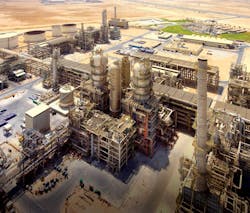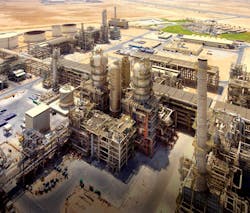Sasol begins FEED phase for integrated GTL and ethane cracker complex in Louisiana
South African-based energy and chemicals company, Sasol, said Dec. 3 that it will proceed with the front-end engineering and design (FEED) phase for an integrated, 96,000 bbl/d gas-to-liquids (GTL) facility and a world-scale ethane cracker with downstream derivatives, at its Lake Charles site in southwestern Louisiana.
At a media conference Dec. 3 with Louisiana Gov. Bobby Jindal, Sasol CEO David Constable said there is significant opportunity to beneficiate the abundant gas reserves in the United States by leveraging Sasol's GTL experience and technology. Sasol's commercially proven GTL process diversifies the use of natural gas through the production of premium quality liquid fuels and chemicals.
"Sasol is proud to be driving forward with the next phase of the strategic mega-projects that we have announced today. Through our innovative energy and chemicals technologies, we will provide the United States with world-class, cleaner-burning fuel, contribute to the country's energy security, boost downstream manufacturing capacity, and diversify the utilization of domestic gas resources," Constable said.
"Sasol envisions a game-changing partnership with the state that could yield significant benefits not only for our company but for the community and for the country. By incorporating GTL technology into the USA's energy mix, states such as Louisiana will be able to advance the country's energy independence, through a diversification of supply. We greatly appreciate the support we have received from the State of Louisiana and Governor Jindal, along with the people of Calcasieu Parish, in reaching these significant project milestones. We look forward to furthering our interests in the region, and continuing our engagement with all our stakeholders."
Sasol's planned Louisiana GTL and ethane cracker complex will resemble the company's Qatar facility, shown here.
Photo courtesy of Sasol
Governor Jindal said, "Today is a great day for Westlake, Calcasieu Parish and our entire state. Today's announcement is not only one of the most exciting announcements in the history of Southwest Louisiana, but one of the most significant economic development wins our state – and our nation – has ever recorded. Sasol is one of many energy companies that is expanding in Louisiana because of our world class energy infrastructure, strong business climate, and incomparable workforce.
"Never before in our nation's history has there been a greater call for energy independence, but that independence will only result from a meaningful application of innovative and practical solutions for new sources of energy. This project is a giant step forward to help our country become more energy independent and less reliant on foreign sources of energy.
"This project will be the largest single manufacturing investment in the history of Louisiana and it also represents one of the largest foreign direct investment manufacturing projects in the history of the entire United States. Despite a national economic downturn, this historic economic development win is happening in Louisiana because we have been laser focused on job creation by creating an environment where businesses want to invest and create jobs for our people."
The GTL facility, the first of its kind in the US, will produce four million tons per annum (mtpa), or 96 000bbl/d of high quality transportation fuel, including GTL diesel and other value-adding chemical products.
Current project costs for the GTL facility are estimated between US$11 billion and US$14 billion. The GTL project will be delivered in two phases, with each phase comprising 48 000 bbl/d. The first phase is planned to come into operation in the 2018 calendar year and the second phase the following calendar year.
The world-scale ethane cracker will allow Sasol to expand its differentiated ethylene derivatives business in the US. The cracker will also benefit from the current low US natural gas prices and the abundance of ethane.
Current cracker project costs are estimated between US$5 billion and US$7 billion. Sasol expects beneficial operation to be achieved during the 2017 calendar year. It will produce an estimated 1.5 mtpa of ethylene with downstream derivative plants. Sasol also has a differentiated portfolio of ethylene-based technologies that will enable it to meet growing demand for high value-add chemicals.
The integrated GTL and ethane cracker projects will, together, create a minimum of 1,200 permanent positions, 7,000 construction jobs at peak and thousands of indirect jobs both in Louisiana and in the rest of the US.
Sasol asked to end business with IranUnited Against Nuclear Iran (UANI) has called on South African energy giant Sasol to immediately declare an end to its business in Iran and take the steps necessary to complete such an exit. Sasol maintains an active presence in Iran through the Arya Sasol Polymer Company (ASPC), which operates two polyethylene plants in Iran. The company is a $900 million joint venture between Sasol and Iran's state-owned National Petrochemical Company (NPC). The NPC is sanctioned by the US and is identified by the international community as an entity of concern for procurement of weapons of mass destruction and proliferation. ivest from Iran, but has not yet severed its ties. In a Dec. 19 letter to Sasol executives, UANI CEO, Ambassador Mark D. Wallace, noted that the US Government Accountability Office in December identified Sasol on a list of "Foreign Firms Engaged in Commercial Activity in Iran's Energy Sector." UANI also noted that Sasol, at the same time, "has aggressively sought to expand its business operations in the United States," including building the multi-billion dollar plant in Westlake, Louisiana outlined on these pages. Given the clear conflict of doing business in both Iran and in the US, UANI called on Sasol "to immediately clarify the full extent and nature of its Iran business dealings, as well as to provide a definitive date as to when such business dealings will end." UANI then received direct correspondence from Sasol. In that correspondence, Sasol stated that its CEO, David Constable, "is not involved in any matter regarding Sasol's activities in Iran," and that while Sasol "has also taken active steps to reduce and eventually cease all of its business with Iran[,] … Divesting of Sasol's interest in ASPC has unfortunately proved to be more complicated than originally anticipated." Said Sasol: "We are unable to commit to a fixed date for our activities to cease …" Ambassador Wallace wrote a sharp letter to Sasol executives dated Jan. 4 in which he noted that 14 months have passed since the company announced its intention to divest its Iran business, but that Sasol has thus far failed to complete such divestment. He warned that Sasol's continuing presence in Iran is being exploited by the regime for propaganda purposes. UANI requested a reply from Sasol by Jan. 11. |

